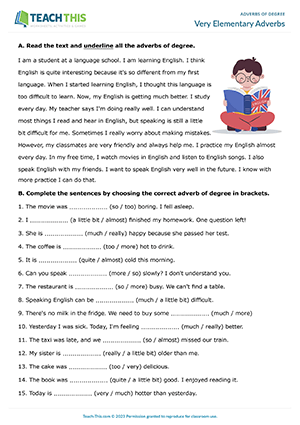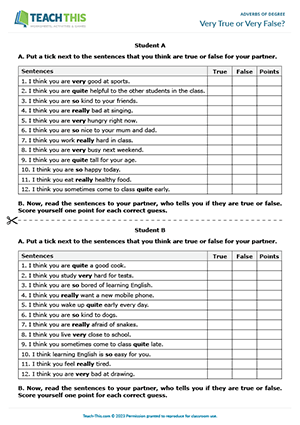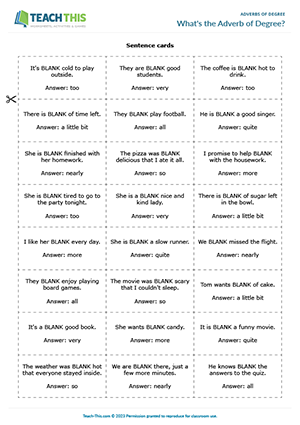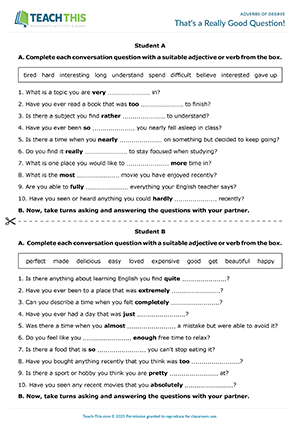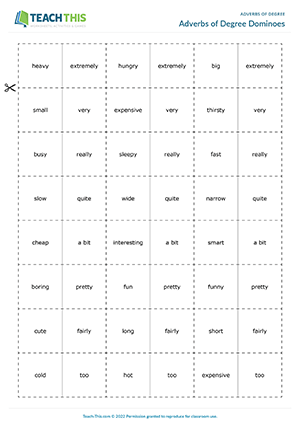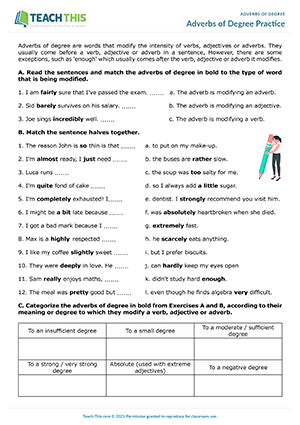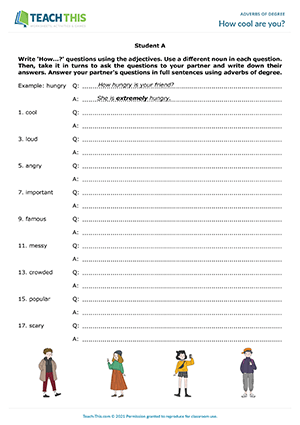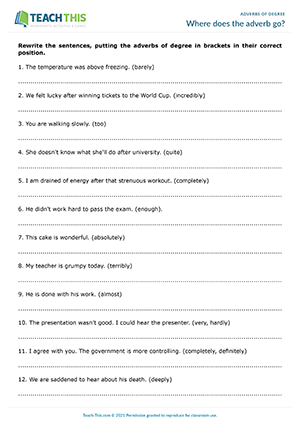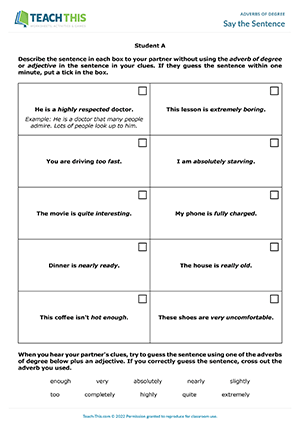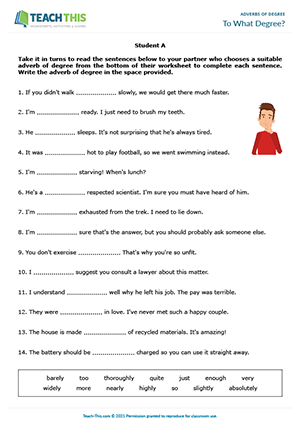This productive adverbs of degree worksheet helps students learn and practice the adverbs of degree: quite, almost, very, too, so, really, a little bit, more, and much. Students begin by reading a text and underlining all the adverbs of degree. Students then complete sentences by choosing the correct adverb of degree in brackets. Next, students rewrite four sentences so that they include the correct adverbs of degree. After that, students use words from a box to make six sentences. Each sentence should contain one adjective or verb and one adverb of degree. Following that, students unscramble four questions containing adverbs of degree. Finally, students take turns asking and answering the questions with a partner.
In this insightful adverbs of degree game, students practice the adverbs of degree: very, so, really and quite. Working alone, students read sentences that contain adverbs of degree and decide if they are true or false for their partner, putting a tick accordingly. Next, students take turns reading the sentences to their partner, who tells them if they are true or false. Students score one point for each correct guess. The student with the most correct guesses wins the game.
In this fast-paced adverbs of degree game, students practice the adverbs of degree: more, a little bit, so, very, quite, all, nearly, and too. In groups, the reader picks up a card and reads the sentence aloud to the players using the word 'blank' for the missing adverb of degree, e.g. 'They are 'blank' good students.' The players listen and then race to grab the correct adverb of degree card to complete the sentence, e.g. very. The first player to grab the correct adverb of degree card from their set and give it to the reader, saying the adverb of degree at the same time wins and keeps the sentence card. The adverb of degree card is then placed back in the player's set. The student with the most sentence cards at the end of the game wins. Afterwards, students repeat the game with a different student reading the sentences.
In this enjoyable adverbs of degree speaking activity, students practice using adverbs of degree with adjectives and verbs by completing, asking and answering conversation questions. First, in two groups, students complete each conversation question with a suitable adjective or verb from a box. Next, students pair up with someone from the other group. Students then take turns asking the conversation questions to their partner, who responds using the corresponding adverb of degree and verb or adjective. Finally, students share what they learned about their partner with the class.
In this creative adverbs of degree game, students play dominoes by making sentences with adjectives modified by adverbs of degree. The first player places one of their dominoes at either end of the domino on the table, pairing an adverb of degree with an adjective or vice versa. The player then makes a sentence using the adverb of degree and adjective and says it to the group, who judge the sentence, e.g. 'The movie was very funny'. If the sentence is grammatically correct and makes sense, the domino remains in place. If not, the player must take back the domino. The player then writes down the subject of the sentence to keep track of the nouns used. The same subject may not be repeated in subsequent sentences. Play then passes to the next student and so on. The first player to get rid of all their dominoes wins the game. As a variation, students can play the game using a points system. For each correctly matched adverb of degree and adjective, students score a point. Then for an extra point, students try to make a sentence with the two words.
This free adverbs of degree worksheet helps students practice modifying adverbs, adjectives, and verbs with adverbs of degree. To begin, students read sentences and match adverbs of degree to the type of word that is being modified. Next, students match sentence halves that contain adverbs of degree. Students then categorize the adverbs of degree, according to their meaning or degree to which they modify a verb, adjective or adverb. Students then underline the correct adverbs of degree in a set of sentences. After that, students arrange words to make sentences containing adverbs of degree. Next, students complete sentences with one of the adverbs of degree shown. In the last exercise, students complete four sentences with true information and four with false information. Finally, students read the sentences to a partner to see if they can guess which sentences are true and which are false.
In this engaging adverbs of degree speaking activity, students practice responding to How questions with adverbs of degree. First, students write a set of How...? questions with the adjectives shown. Next, students take it in turns to ask the questions to their partner, who answers each question in sentence form using an adverb of degree, modifying the adverb with not to express minimal degree when needed. The student then writes the response down on the worksheet. Finally, students share what they found out with the class.
In this useful adverbs of degree word order worksheet, students practice the position of degree adverbs in a sentence. First, students rewrite sentences, putting adverbs of degree in brackets in their correct position. When the students have finished, check the answers with the class and review the meanings of the adverbs of degree.
In this fun adverbs of degree game, students describe and guess sentences that contain adverbs of degree and adjectives. One student begins by choosing a sentence from their worksheet and giving clues to describe it without using the adverb of degree or adjective in the sentence. Their partner then has one minute to say the sentence using one of the adverbs of degree at the bottom of their worksheet and an adjective. If their partner guesses the sentence within one minute, the student puts a tick in the box. It is then the other student's turn to describe a sentence. The student with the most correct guesses at the end of the game wins.
In this entertaining adverbs of degree game, pairs of students race against each other to complete sentences with adverbs of degree. Students take it in turns to read out sentences to their partner who chooses a suitable adverb of degree from the bottom of their worksheet to complete each sentence. The student who reads the sentence then writes the adverb of degree down in the space provided. Students continue taking it in turns reading out sentences until they are all complete. The first pair to correctly complete all the sentences wins.
Latest Free
Resources
- Count on Me!
Making Offers and Promises (A2)
Date Added: 11th of February
- It’s Carnival Time!
Cultural Celebrations (B1)
Date Added: 29th of January
- Identifying and Clarifying Problems
Dealing with Problems (B2)
Date Added: 1st of November
- The Bus Stop
Getting Around (B1)
Date Added: 1st of October
- Study Skills Showdown
Study Skills (B2)
Date Added: 10th of September
Latest Member
Resources
- Who has asked the right question?
Present Perfect Wh Questions (B1)
Date Added: 26th of February
- Perfectly Played!
Present Perfect Wh Questions (B1)
Date Added: 25th of February
- Present Perfect Wh Question Time
Present Perfect Wh Questions (B1)
Date Added: 24th of February
- Express, Justify and Debate!
Speaking Test Preparation (B1)
Date Added: 20th of February
- Logical Fallacy Bingo
Critical Thinking (B2)
Date Added: 20th of February



